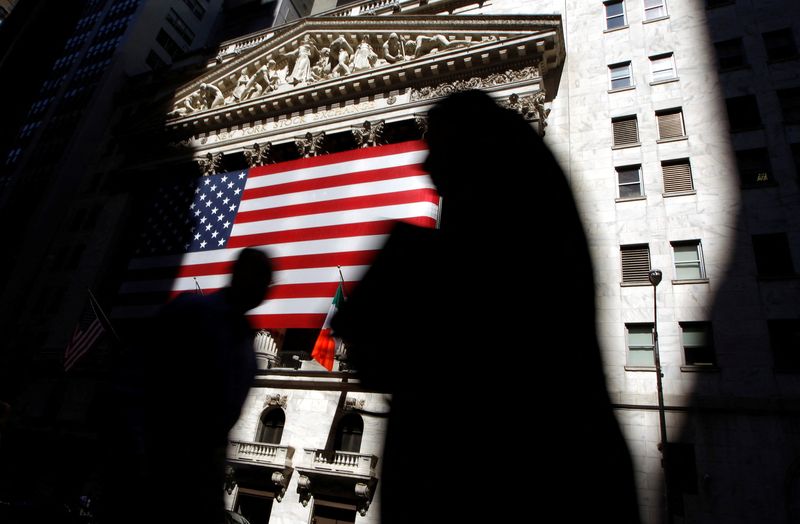Investing.com -- U.S. stock futures point lower, suggesting a negative start to the week for equities. Markets are turning their gaze to key monthly U.S. inflation data on Tuesday, which could factor into how the Federal Reserve views the path ahead for interest rates this year. Elsewhere, gold hovers near an all-time high, while Bitcoin hits a new record peak.
1. Futures inch lower
U.S. stock futures edged lower on Monday as investors looked ahead to the release of key inflation data later in the week.
By 04:21 ET (08:21 GMT), the Dow futures contract had fallen by 0.2%, S&P 500 futures had dipped by 0.3%, and Nasdaq 100 futures had shed 0.4%.
Wall Street's three main averages ended lower on Friday, with artificial intelligence darling Nvidia (NASDAQ:NVDA) going into reverse after a recent rally to close out a turbulent week. Stocks had initially started the trading day higher following an unexpected jump in U.S. job growth in February.
Nvidia dropped more than 5%, slipping to its worst one-day performance since late May and snapping a six-session straight winning streak. Shares in the company ended the week with gains of over 6%, however.
2. Inflation data ahead this week
Investors will be looking to Tuesday's U.S. inflation data as they try to gauge how soon the Fed could start cutting interest rates.
Economists are expecting February's overall consumer price index to rise 0.4% on a monthly basis after a faster than expected increase of 0.3% in January, due in part to an anticipated jump in gasoline prices. The so-called "core" measure, which strips out volatile items like food and energy, is seen slowing to 0.3% month-on-month, down from 0.4%.
On Thursday, Fed Chair Jerome Powell said it would likely be appropriate to reduce rates “at some point this year,” but made it clear that he and his colleagues aren’t ready yet.
Market watchers will also be keeping an eye on Thursday’s retail sales data for February, which is expected to rebound 0.8% after falling the same amount a month earlier.
3. Gold prices steady
Gold prices were hovering just below record highs in European trade on Monday, with the focus in markets turning largely to the upcoming U.S. inflation data.
Bullion prices touched record highs last week, particularly after Powell said that price gains were close to slowing to levels the Fed was comfortable with. The comment fueled hopes that the Fed will soon begin to ratchet borrowing costs down from more than two-decade highs.
The February labor market report, which pointed to a resilient but softening U.S. employment picture, also aided bullion prices, as did weakness in the dollar and Treasury yields.
Spot gold had gained 0.1% to $2,181.45 an ounce, while gold futures expiring in April had climbed 0.1% to $2,188.05 an ounce by 04:22 ET. Last week, gold futures hit an all-time high of $2,203.0 an ounce, while spot gold rose to a record $2,195.20 an ounce.
4. Bitcoin new record high
Bitcoin's recent spike showed no signs of abating on Monday, as the world's most popular cryptocurrency crested a fresh record high of $70,400 in European trading.
The token was exchanging hands at $71,554.1 by 04:24 ET.
Demand for Bitcoin has been boosted by the approval earlier this year of new exchange-traded funds tracking its price, as well as expectations that the Fed will soon start to move away from a restrictive policy stance. The market has also been underpinned by an upcoming "halving" event that will stem some of the flow of Bitcoin minting.
A previous Bitcoin boom in 2021 was followed by a "crypto winter", when bankruptcies and collapses at the largest crypto firms left millions of investors out of pocket, prompting regulators to step up warnings about the risks associated with the industry.
5. Oil prices muted
Oil prices were mostly subdued in early European trade on Monday, as markets remained on edge over slowing demand and gauged potential supply constraints posed by ongoing geopolitical tensions in the Middle East and Russia.
Chinese oil import data for the first two months of 2024 largely underwhelmed last week, underlining concerns over easing demand. China is the world's top crude importer.
These worries were further exacerbated by persistent uncertainty over the path of U.S. interest rates.
Brent oil futures were mostly unchanged at $82.10 a barrel, while West Texas Intermediate crude futures had dipped 0.1% to $77.46 per barrel by 04:25 ET.
